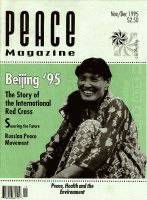
Peace Magazine Nov-Dec 1995, page 26. Some rights reserved.
Search for other articles by Bev Delong here
Search for other articles by Henrietta Langran here
If you signed the Declaration of Conscience, your written opposition to nuclear weapons is being considered by a panel of judges in The Hague. On Oct. 30, the International Court of Justice (the "ICJ" or "World Court") began hearings on the legality of the use, and the threat of use, of nuclear weapons. These proceedings are the culmination of a nine-year effort on the part of 100 million citizens world-wide, including thousands of Canadians.
In May 1993, the World Health Organization (WHO) voted to request an opinion on the legality of the use of nuclear weapons. On Dec. 14, 1994, the U.N. General Assembly (UNGA) voted to request an opinion on the legality of both the use and the threat of use. Thus the UNGA question is broader than the WHO question.
According to the registrar of the ICJ, 42 states have made submissions on the WHO and UNGA questions. Approximately two-thirds of them argue for the illegality of nuclear weapons. Though Canada did not choose to make a submission on either of the two questions, it still has the right to participate in the oral proceedings.
The ICJ, the principal judicial organ of the U.N. is based in The Hague, The Netherlands. The Court has 15 judges who are elected by the UNGA and the Security Council and represent the world's geographic regions and legal systems. Judges are elected from among persons of high moral character who are either qualified to hold the highest judicial offices in their own countries or qualified as legal consultants of recognized competence in international law.
The ICJ is bound to apply all recognized sources of international law: treaties, customs, general principles of law, judicial decisions, and "writings of the most qualified publicists."
The laws regarding warfare include the following basic rules:
Although a ruling by the Court that nuclear weapons are illegal would not be binding and would not lead to immediate and widespread disarmament, the influence of such a decision should not be underestimated. A ruling of illegality would establish a legal, moral, and political norm for all countries. It would give legal and public support for an international convention banning nuclear weapons. Such a decision would promote respect for the role of international law, be a "next step" toward greater disarmament, and encourage peace workers throughout the world. The recent convention on chemical weapons is only one example of what is possible.
Our hope is that if the Court renders a favorable opinion, then members of the military will need to refresh themselves on the Nuremberg Principles of 1946 and 1950. These principles require soldiers to disobey commands which would require them to act contrary to the rules of international law.
A ruling that perhaps a limited form of use is legal would simply define areas in which further international agreement is required if we wish to abolish nuclear weapons. It may so enrage the public that the political will is mobilized for a Convention on the Abolition of Nuclear Weapons.
This extraordinary legal case, regardless of its outcome, should allow international law to assist in the process of nuclear disarmament.
Bev Tollefson Delong works with Lawyers for Social Responsibility. Henrietta Longren works with Physicians for Global Survival.

Peace Magazine Nov-Dec 1995, page 26. Some rights reserved.
Search for other articles by Bev Delong here
Search for other articles by Henrietta Langran here